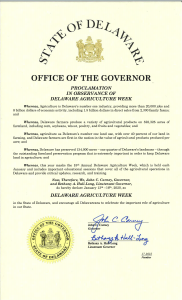Governor Carney declares Delaware Agriculture Week January 13 through January 17, 2020
DOVER, Del. – Governor John Carney and the Delaware Department of Agriculture on Thursday announced Delaware farmers’ markets hit an all-time high sales record of $3.28 million in 2019. The announcement comes during the 15th Annual Delaware Agriculture Week held at the State Fairgrounds in Harrington, a week-long conference that covers agricultural operations in Delaware and provides critical updates, research, and training for members of the industry. Governor Carney issued a proclamation declaring the week of January 13 to January 17, 2020 as “Delaware Agriculture Week.”
Click here to view the proclamation. 
“Delaware has a rich farming history, and agriculture remains our number one industry. It’s no surprise Delaware’s farmers markets continue to gain popularity with Delawareans and visitors to the state who want to purchase local, Delaware grown foods and farm-fresh products from family farms,” said Governor Carney. “Agriculture contributes $8 billion to Delaware’s economy, and we’ve permanently preserved 25 percent of Delaware’s farmland so that agriculture will continue to be the backbone of our economy.”
Delaware’s Secretary of Agriculture Michael T. Scuse said in a time when ordering groceries using an app and picking up curbside is popular, these figures are indicative of how much people value the connection with the farmers growing their food.
“Looking at 2019, the weather was cooperative, and our farmers had a lot of great produce to sell at our local farmers’ markets,” said Scuse. “Delaware produce is seasonal and changes from month to month, week to week. The variety of Delaware grown fruits, vegetables, herbs and other items provides a lot of options for consumers who want to eat healthy.”
Sales from all 19 Delaware community-run farmers’ markets this year totaled $3,277,788, up more than $394,086 from 2018 – an increase of 13.7 percent. Sales have increased more than elevenfold since the Department of Agriculture began tracking them in 2007.
Fresh produce made up 57 percent of total sales, with the remainder coming from products such as meats, cheeses, jellies, breads, salsa, eggs, or honey.
In 2019, there were 14 markets that participated in the Senior Farmers’ Market Nutrition Program and the Women, Infants, and Children Farmers’ Market Nutrition Program. Both programs had their highest participation since Delaware began offering these benefits. There were 9 markets that participated in the Supplemental Nutritional Assistance Program (SNAP). These programs help expand access for low-income residents to be able to purchase fresh local produce at Delaware farmers’ markets.
Delaware farmers’ markets are all run at the local level, by municipalities, business groups, farmers or market associations, with the Department of Agriculture providing support and marketing assistance.
The 2020 market season will begin in April; most markets start their operations in May, June, and July. A list of the 2019 markets is online at Delaware Grown, and will be updated in late March for 2020.
###
 “Since the start of my administration, I have placed a high priority on preserving Delaware’s farmland so that agriculture will continue to be our state’s number one industry,” said Governor Carney. “I am proud to announce the largest round of Delaware farms permanently preserved through the Delaware Agricultural Lands Preservation Program in the history of the program. With the purchase of the development rights of
“Since the start of my administration, I have placed a high priority on preserving Delaware’s farmland so that agriculture will continue to be our state’s number one industry,” said Governor Carney. “I am proud to announce the largest round of Delaware farms permanently preserved through the Delaware Agricultural Lands Preservation Program in the history of the program. With the purchase of the development rights of